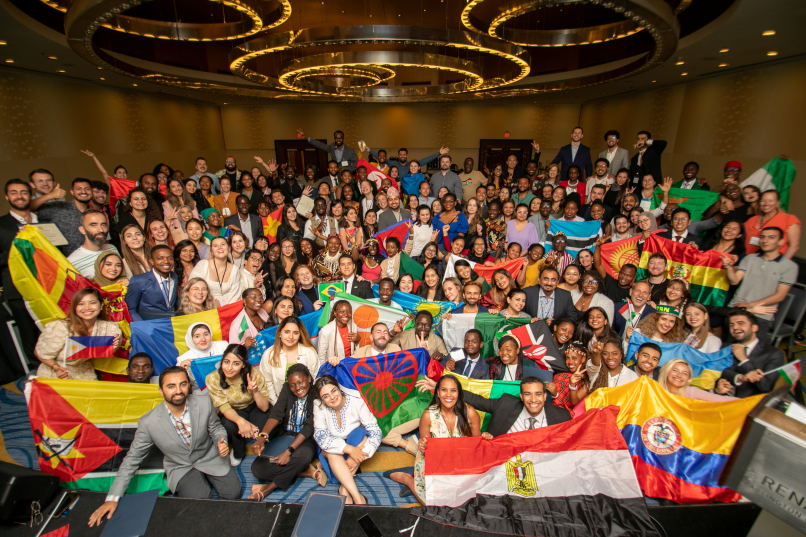Community Engagement Exchange Program Application Information

The 2026 Community Engagement Exchange (CEE) Program application is closed. Please stay tuned to our website and social media pages for information regarding the next application period.
The CEE Program is a dynamic global network of innovators working with communities to address critical 21st Century issues. CEE equips dedicated visionaries with the expertise, skills, and resources to develop multisector approaches and build healthy and engaged communities in the U.S. and around the world.
A transformational leadership development experience, CEE is a year-long program designed to enable civil society leaders, ages 21-27, to harness the power of networks, relationships, and information for the public good.
Fellowship components include:
- Three-month Practicum in the United States: IREX matches CEE fellows to civil society organizations throughout the United States. Designated supervisors and peers support the fellows through a three-month, hands-on professional practicum.
- Leadership and Civic Engagement Academy: CEE fellows explore the program themes through interactive curriculum that includes service learning, face-to-face trainings, mentorship, professional coaching, and inclusion in a global network.
- Community Engagement Project (CEP): With the help of their U.S. host organization and mentors, CEE fellows design and plan a community engagement project to carry out after they return home. Once the fellows depart the U.S., they put these projects into action in their home communities.
- Community Engagement Project (CEP) Exchange: Select U.S. hosts and CEE specialists will travel to a CEE alumnus’ country and work collaboratively to support the fellow’s project implementation and bring back what they learn to strengthen communities across the United States or their home country.
Application Information
If you have any questions about the program or our eligibility requirements, please review our FAQ document or email our team at apply.CEE@irex.org.
Eligibility Requirements
Competition for the CEE Program is merit-based and open to emerging civil society and community leaders who meet the following criteria:
- Age 21-27;
- Citizen of one of the eligible countries listed below;
- Currently living and working in their home country at the time of application;
- Special consideration can be given to individuals living in another country who have refugee status and are working on behalf of their home community.
- Has a minimum of two-years professional or volunteer experience, working on community or civil society issues, at the time of application;
- Working on a community engagement initiative in their home country, either in a professional or volunteer capacity, with a demonstrated intent and vision to pursue a career working to support civil society or within the civil society sector;
- Able to begin the CEE Program in the United States in 2026;
- Able to receive a U.S. J-1 Visa;
- Committed to returning to their home country after completion of the program and implementing a community-based project; and,
- Proficient in spoken and written English at the time of application.
- Semifinalists will be required to take a Duolingo English language test
- Finalists should be able to fulfill most communication goals, even on unfamiliar topics. They should understand the main ideas of both concrete and abstract writing and they should be able to interact with proficient speakers fairly easily.
Individuals in the following circumstances are NOT eligible for the U.S.-based CEE Program:
- U.S. citizens and/or permanent residents of the United States;
- Individuals participating in academic, training, or research programs in the United States or other countries at the time of application;
- Individuals residing or working outside their home countries at the time of application unless the individual is a refugee or holds special refugee status and is working on behalf of their home country/community;
- Individuals who have participated in an exchange visitor program sponsored or funded by the U.S. government (e.g., U.S. Department of State Public Affairs Section of U.S. embassies, or other U.S. government agencies) who have not fulfilled their two-year home residency requirement by the time of application;
- Individuals who have applied for U.S. permanent residency in the past three years; and
- Other criteria to be determined in consultation with ECA, including public-health related status based on guidance from federal agencies at the time of application.
Financial Support
The program covers the cost of most expenses associated with:
- J-1 visa support
- Round-trip travel from participants’ home city to the U.S.
- Monthly allowance to cover housing, meals, and other living expenses while in the U.S. and
- Accident and sickness health benefits
Eligible countries by region
Africa: Cameroon, Democratic Republic of the Congo, Kenya, Madagascar, Mali, Sierra Leone, Uganda, and Zimbabwe.
East Asia and the Pacific: Brunei, Burma, Cambodia, Laos, and Vietnam.
Europe and Eurasia: Czech Republic, Hungary, Poland, and Slovakia.
Middle East and North Africa: Algeria, Egypt, Iraq, Jordan, Lebanon, Palestinian Territories, and Tunisia.
South and Central Asia: Bangladesh, India, Nepal, Sri Lanka, Tajikistan, and Turkmenistan.
Western Hemisphere: Bolivia, Cuba, Guatemala, Haiti, Honduras, Peru, and Venezuela.